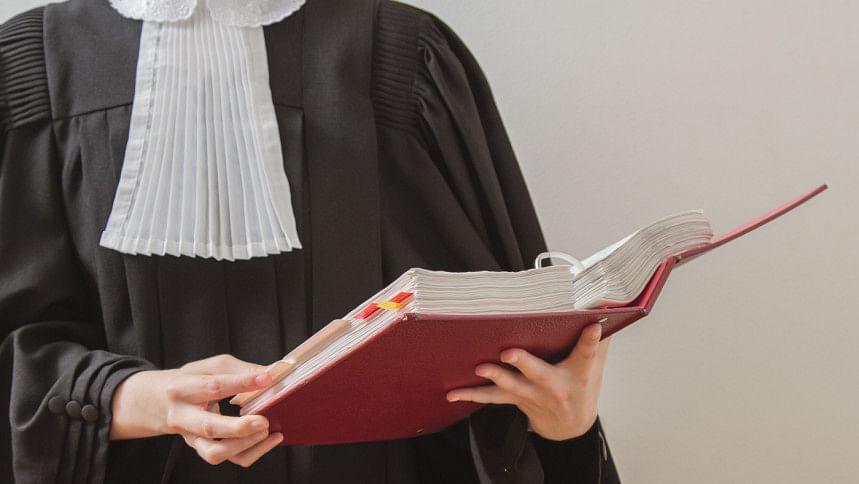Remarkable insight on admission to practice in Bangladesh Bar Council

In Bangladesh, for getting admission in legal profession, a candidate must satisfy certain criteria and procedures. The criteria are set out in article 27 of the Bangladesh Legal Practitioners and Bar Council Order, 1972 i.e. the candidate must be a citizen of Bangladesh, attained minimum twenty one years age, obtained a law degree, etc. Before being enrolled the applicant must qualify in the MCQ test, written and viva voce examinations.
In conjunction with fresh law graduates, under rule 65(ii) of the Bangladesh Legal Practitioners and Bar Council Rules, 1972, the retired judicial officer having held judicial office for a period of at least ten years in the subordinate court can be permitted to practice before the High Court Division other than the subordinate courts only facing viva voce examination. The proviso to this rule was challenged as violative of articles 27 (equality before law), 31 (right to protection of law) and 40 (freedom of profession or occupation) of the Constitution of Bangladesh in the Civil Appeal No. 235 of 2014. The Appellate Division (AD) of the Supreme Court in the case of Bangladesh Bar Council represented by its Chairman, Dhaka v A K M Fazlul Kamir & others confirms that the restrictive embargo i.e. not to practice before the subordinate court, in the impugned proviso is neither unreasonable nor arbitrary and also protects the position and dignity of former judicial officers.
The AD has rightly pointed out that arbitrary actions ordinarily violate equality, but it is simply not true that whatever violates equality must be arbitrary. A law will be violative of article 31 if it is demonstrably unreasonable or arbitrary. Furthermore, the principle of equality does not mean that every law must have universal application to all persons. There are varying needs of different classes of person often require separate treatment. So, the legislature has the competence to exercise its discretion to make classification. For the validity of a classification, it must rationally further the purpose for which the law was enacted. In this connection, the court referred to the conditions as decided in S. A. Sabur v Returning Officer, 41 DLR (AD) 30, for passing the constitutionality test of a classification made in a legislation: a) the classification must be logically correct; and b) the differentia must have a rational relation or nexus to the object sought to be achieved by the statute in question.
So, there are intelligible differentia or permissible criteria for ex-judicial officers having ten years in judicial office and a fresh law graduate. They belong to the same community of advocates but the status of retired judicial officer is a bit higher than the other category of advocates. Moreover, by restricting former judicial officers to practice before any subordinate court has not curtailed the rights but save the existing judicial officials from being embarrassed when adjudicating justice impartially. In addition, the professional ethics and conduct of an advocate cannot be maintained by a former judicial officer if he appears before a subordinate officer who has worked under him earlier.
Raising the importance of enrolment of legal academicians as advocate, the AD has recommended to allow them to practice. The court has given the following valuable observations, ‘If university teachers are allowed to practice in the court the bar will be enriched because they not only teach law but also do research in the field of law. The legal academic and legal practitioners together will contribute in reshaping our collective conscience of jurisprudence capable of catering the new legal challenges surfacing due to rapid change in local and global economy and cutting edge technology.’ The court has also praised the publication of law journals from various public universities covering different areas such as human rights, rule of law, environmental justice and jurisprudence, family court and other issues by analyzing the judgments of the Supreme Court of Bangladesh and foreign courts. For opening the doors of practice for law teachers, the AD has urged that both Bangladesh Bar Council and law faculties must sit together to develop a proposal to facilitate the process for the enrolment of academia.
From this judgment, it becomes clear that the restrictive embargo imposed on the retired judicial officers to practice before the subordinate courts are not violative of constitutional provisions. Moreover, it identifies the necessity of allowing legal academia to practice in the bar for utilizing their legal knowledge and expertise. Finally, the judgment has recognised the Bar Council as public utility service providerby conferring the duties to frame rules for ensuring standard of legal education in private universities and to determine the age limits for enrollment as an advocate.
The writer is an Assistant Professor of Law, Jagannath University.

 For all latest news, follow The Daily Star's Google News channel.
For all latest news, follow The Daily Star's Google News channel. 



Comments